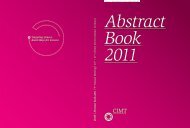Abstract Book 2010 - CIMT Annual Meeting
Abstract Book 2010 - CIMT Annual Meeting
Abstract Book 2010 - CIMT Annual Meeting
You also want an ePaper? Increase the reach of your titles
YUMPU automatically turns print PDFs into web optimized ePapers that Google loves.
L119 Dutoit | Therapeutic vaccination<br />
Functional immune reactivity to antigens of the novel<br />
IMA950 vaccine peptide set in glioma patients<br />
Valérie Dutoit 1 , Norbert Hilf 2 , Steffen Walter 2 , Toni Weinschenk 2 , Philippe Beckhove 3 , Christel<br />
Herold-Mende 4 , Paul Walker 1 , Harpreet Singh 2 and Pierre-Yves Dietrich 1<br />
1 Laboratory of tumor immunology, Oncology department, Geneva University Hospital, Geneva, Switzerland<br />
2 immatics biotechnologies GmbH, Tuebingen, Germany<br />
3 Translational Immunology Unit, The German Cancer Research Center, Heidelberg, Germany<br />
4 Division of Neurosurgical Research, Department of Neurosurgery, University of Heidelberg, Germany<br />
We have recently identified a new set of HLA-A2restricted<br />
glioma antigens isolated by direct elution<br />
from tumor cells for use in glioma immunotherapy.<br />
These antigens were selected from a large panel<br />
of eluted peptides according to overexpression in<br />
glioma compared to normal brain and other tissues,<br />
and relevance in tumorigenesis. In vitro peptide<br />
immunogenicity was investigated in healthy individuals,<br />
guiding the final vaccine peptide composition.<br />
Here, in order to validate the use of the novel peptide<br />
set for multipeptide vaccination, T cell reactivity<br />
and absence of tolerance was investigated in patients<br />
with malignant glioma. In addition, peptidespecific<br />
T cell function was assessed in vitro. All<br />
patients responded to several glioma peptides, suggesting<br />
that this multipeptide vaccine may benefit<br />
the majority of HLA-A2+ patients. Moreover,<br />
glioma peptide-specific CD8+ T cell clones generated<br />
from the blood of glioma patients were able to<br />
efficiently kill antigen-expressing tumor cells, but<br />
not K562 cells. Finally, CD8+ T cells specific for a<br />
brevican epitope were detected at the tumor site in<br />
one patient, showing that, for this antigen, spontaneously<br />
elicited specific T cells are retained at the<br />
tumor site. Altogether, our results validate the use<br />
of the ten novel glioma antigens in multipeptide<br />
vaccination and adoptive cell therapies for patients<br />
with glioma.<br />
57



